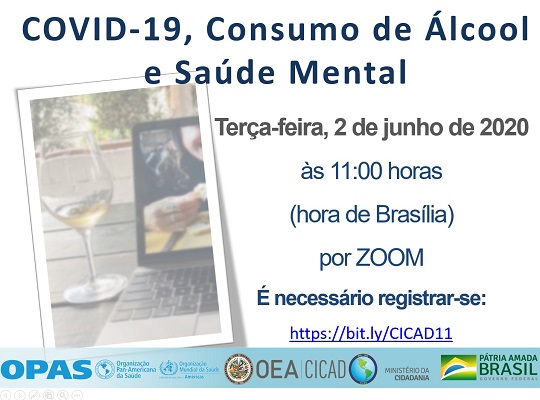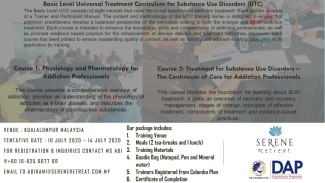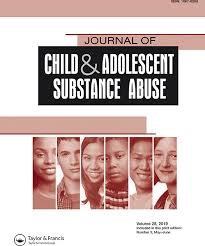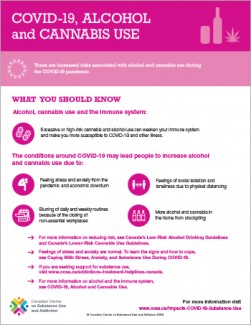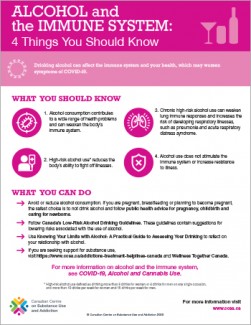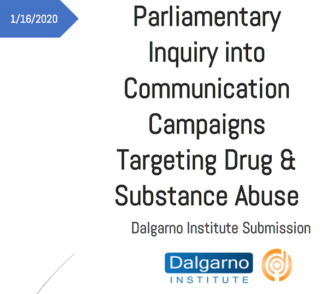Search
UTC / UPC Workshop for Addiction Professionals
Basic Level Universal Treatment Curriculum for Substance Use Disorders (UTC)
The Basic Level UTC consists of eight courses that cover the broad spectrum of addiction treatment. Each course consists of a Trainer and Participant Manual. The...
Addiction Psychiatry and COVID-19 – Impact on Patients and Service Provision
One Size Doesn’t Fit All: A Thematic Analysis of Interviews with People who Have Stopped Participating in Narcotics Anonymous in Norway
Background
For persons with substance use disorders (SUDs), 12-step groups (TSGs) are the most available and used peer-based recovery resource, worldwide. However, disengagement is common, and attrition may partly be due to practices and...
How You Can Help Prevent an Opioid Related Death
New resource on how to help prevent an opioid related death. Learn about an overdose including the symptoms, how to respond, information on naloxone, tips on preventing an overdose, and resources for seeking help. Download and share now.
The CHILD Intervention for Living Drug-Free Comprehensive Assessment of Risk, Resilience, and Experience (CHILD CARRE) Measure: Initial Findings
This paper summarizes the development and evaluation of an assessment instrument for children ages 7–12. The CHILD CARRE measure is a semi-structured interview with 7 domains. Children from the USA and Argentina (N¼134) completed baseline...
UNODC Coronavirus Resource List
As part of the effort to provide information and support to people who use drugs, families, and professionals working in the substance use and addiction field, UNODC has produced a series of resources to guide evidence-based practice.
Here...
Impact of Marijuana on Adolescent Health
Learn how using marijuana during adolescence can impact health including affecting the brain, mental health, and increasing risk for addiction and other harms.
COVID 19, Alcohol and Cannabis Use Infographic and Report
This report and infographic, published by the Canadian Centre for Substance Use and Addiction, summarises mechanisms through which COVID-19, alcohol and cannabis use may influence one another reciprocally.
COVID-19 may influence alcohol...
Alcohol and the Immune System: 4 Things You Should Know
Alcohol has a negative impact on our immune systems ability to function, leading to greater susceptibility to certain diseases.
It is particularly important that, during this pandemic, we protect our immune system in order to give...
Parliamentary Inquiry into Communication Campaigns Targeting Drug & Substance Abuse
Submission to Parliamentary Inquiry:
Illicit drug demand is at a critical juncture particularly at a time where the Australian criminal drug manufacturing and distribution networks are well established, sophisticated and tremendously...
Conocimientos, habilidades y actitudes profesionales para la intervención breve en adicciones
Resumen
Introducción: la capacitación continua y certificación de los profesionales de atención primaria de salud apoyan la implementación de intervenciones breves para abordar el uso de drogas.
Objetivo: validar los materiales de...
Alcohol Use in Times of the COVID-19 Virus
During this global lockdown, most people have had to make major lifestyle changes in order to adhere to guidelines outlined by their respective governments.
The situation has forced people's behaviour and choices to change, and it is...
Inhibition of Cardiac Sodium Currents by Toluene Exposure
Abstract
Toluene is an industrial solvent widely used as a drug of abuse, which can produce sudden sniffing death due to cardiac arrhythmias. In this paper, we tested the hypothesis that toluene inhibits cardiac sodium channels in Xenopus...
Prenatal Exposure to Cannabis and Maternal and Child Health Outcomes: A Systematic Review and Meta-Analysis
Abstract
Objective: To assess the effects of use of cannabis during pregnancy on maternal and fetal outcomes.
Data sources: 7 electronic databases were searched from inception to 1 April 2014. Studies that investigated the effects of use...
Drinking Patterns and the Distribution of Alcohol-Related Harms in Ireland: Evidence for the Prevention Paradox
Abstract
Background
According to the prevention paradox, the majority of alcohol-related harms in the population occur among low-to-moderate risk drinkers, simply because they are more numerous in the population, although high-risk...
Cannabinoid Exposure in Rat Adolescence Reprograms the Initial Behavioral, Molecular, and Epigenetic Response to Cocaine
Significance
The endocannabinoid system has a modulatory role in brain reward and cognitive processes. It has been hypothesized that repeated interference with endocannabinoid signaling (e.g., through abuse of cannabis or synthetic...
Association of Prenatal Alcohol Exposure and Offspring Depression: A Negative Control Analysis of Maternal and Partner Consumption
Abstract
Background
Previous research has suggested that intrauterine alcohol exposure is associated with a variety of adverse outcomes in offspring. However, few studies have investigated its association with offspring internalizing...
Longitudinal Assessment of Mental Health Disorders and Comorbidities Across 4 Decades Among Participants in the Dunedin Birth Cohort Study
Abstract
Importance: Mental health professionals typically encounter patients at 1 point in patients’ lives. This cross-sectional window understandably fosters focus on the current presenting diagnosis. Research programs, treatment...
Long-Term Effectiveness and Cost-Effectiveness of Videoconference-Delivered Cognitive Behavioral Therapy for Obsessive-Compulsive Disorder, Panic Disorder, and Social Anxiety Disorder in Japan: One-Year Follow-Up of a Single-Arm Trial
ABSTRACT
Background: Face-to-face individual cognitive behavioral therapy (CBT) and internet-based CBT (ICBT) without videoconferencing are known to have long-term effectiveness for obsessive-compulsive disorder (OCD), panic disorder (PD)...
Share the Knowledge: ISSUP members can post in the Knowledge Share – Sign in or become a member
